When first COVID-19 and then widespread looting and vandalism closed jewelry retail locations in the first two quarters of 2020, business prospects seemed dire. Nearly every small business owner was affected in some way. Here are the stories of a select few independent jewelry retailers who were creative and resourceful in the face of unforeseen and unprecedented challenges. They reinvented business models and completed renovations while finding strength in reaching out to others, in carrying on family businesses and in realizing the role they play in the lives of their employees and their communities.
The Malkas See Their Future Beyond Four Walls
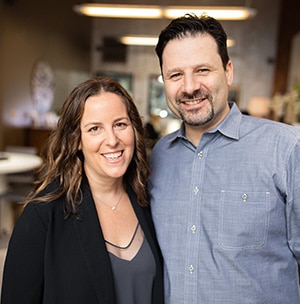
Ronnie & David Malka
When husband-wife team David and Ronnie Malka set up Malka Diamonds & Fine Jewelry in a historical building in the mini-diamond district of downtown Portland, OR, their business model was based on person-to-person communication, much of it consultations about custom design with David, a graduate gemologist. E-commerce was something they thought they’d get to at some point, but it seemed like a huge undertaking to contemplate.
In mid-March of 2020, forced to close due to a pandemic lockdown, Ronnie sprang into action, quickly linking a Shopify account to the website and posting a curated selection of inventory focused on unique settings and the kinds of gemstones popular with their young, wedding-minded clientele: salt-and-pepper and geometric-shaped diamonds, sapphires and vintage bridal pieces.
E-commerce, digital communication and their already-established social media have been vital ever since.
Advertisement
“Because we’re a brick-and-mortar store, we’re able to engage with FaceTime, virtual appointments, phone calls,” Ronnie says. “If they have questions, we immediately answer. It feels like it’s an extension of the store.”
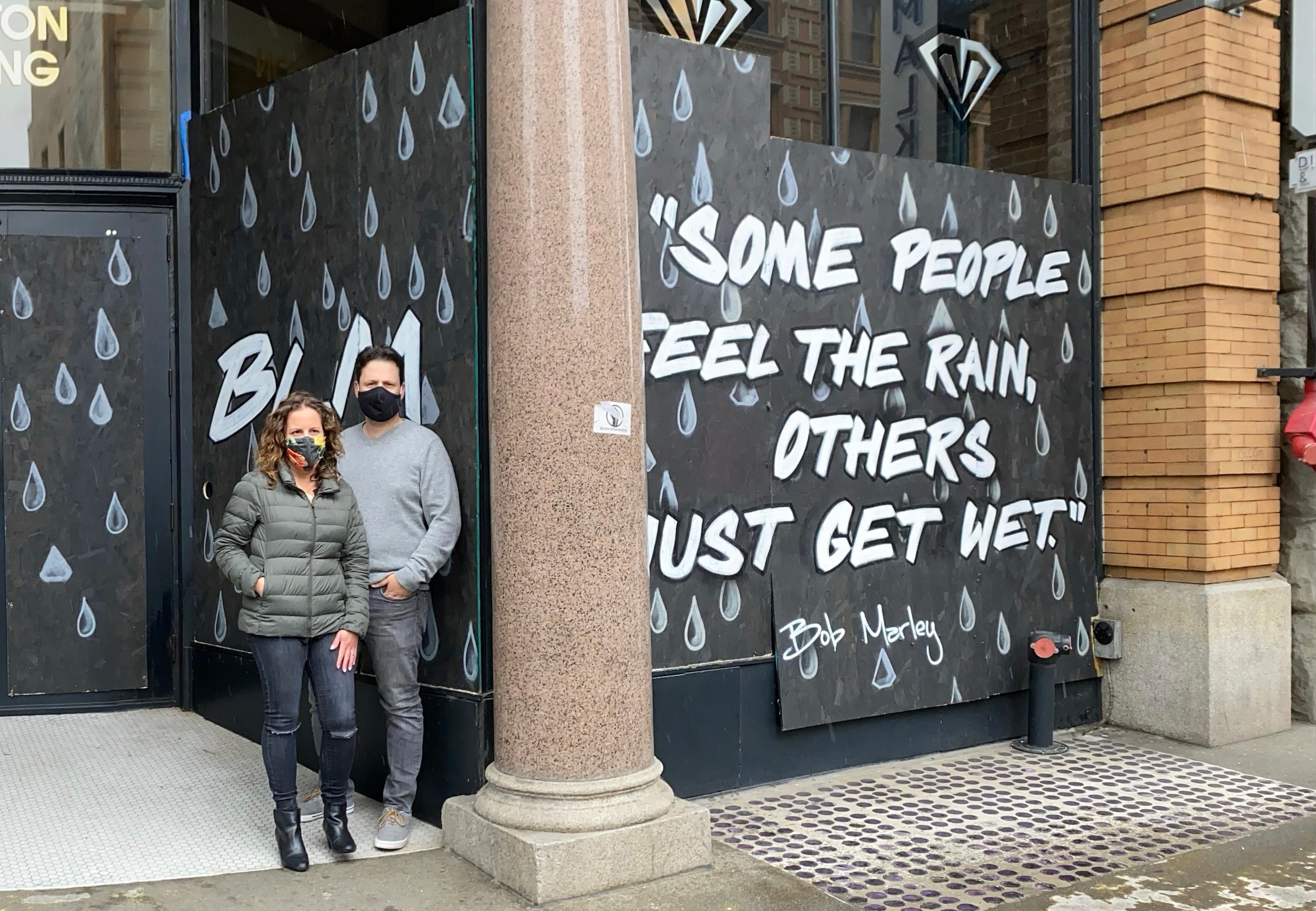
They’ve also sought feedback from online clients and, in response to learning that out-of-state clients seek assurances that the store is LGBTQ-friendly, Ronnie added an entire landing page to the site to ensure they got a proper welcome.
By mid-May, small shops in Portland were allowed to reopen, and the Malkas lined up appointments. On May 31, a peaceful gathering of speakers convened in downtown Portland to honor George Floyd and talk about the Black Lives Matter movement. Soon, though, that peaceful crowd was overtaken by angrier people, not affiliated with BLM, who were intent on destruction. When police pushed them out of the area around the Justice Department, they moved into a commercial area, damaging and looting an Apple Store and a Louis Vuitton location. Eventually, they found the diamond district of Portland.
“We saw it on the news, and then we saw it on our surveillance camera,” Ronnie says. “A hundred people came through there and destroyed the store, pushing over showcases.” Unfortunately, that happened more than once. “There were weeks and weeks of it. Every jewelry store in town got hit at least twice.” In response, the Malkas commissioned a local artist to paint words of support for BLM on their boarded-up windows.
Their storefront is still boarded up, but the Malkas have moved on. “We had no choice really,” Ronnie says. “It wasn’t going to be safe.” Because the space was in a historical building, they weren’t able to alter the facade of the building to make it less vulnerable.
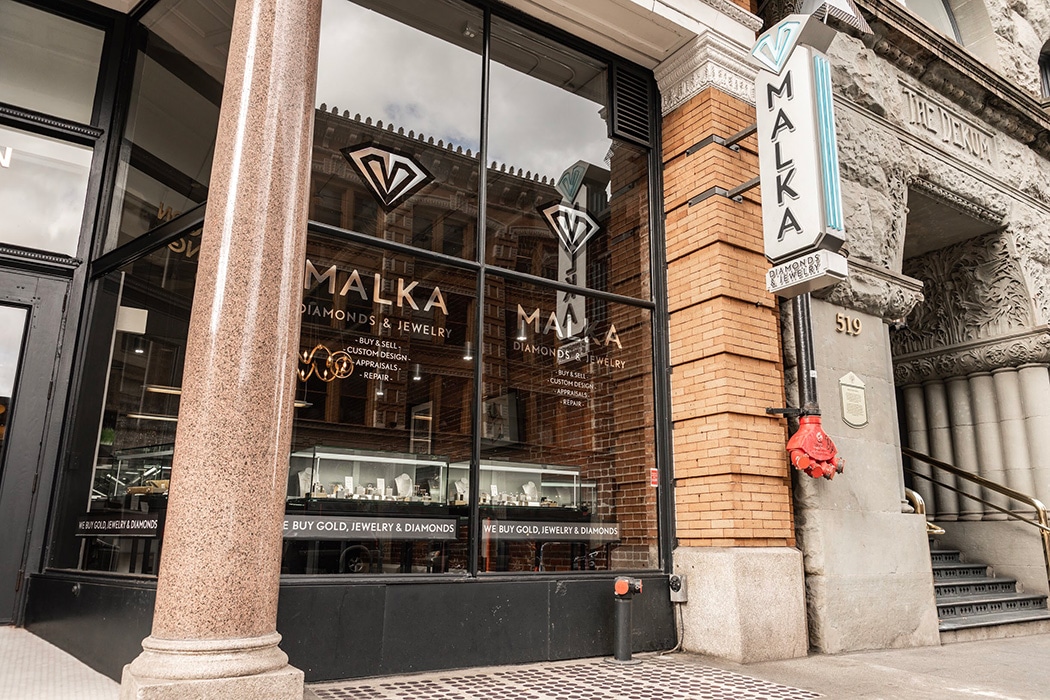
At first, they set up shop in office space nearby. Although there was no foot traffic, people continued to call and make appointments to discuss engagement ring projects. “That was a cool realization for us, that we’re not just the four walls we were in. We have a presence in Portland.”
Business remained good into 2021, and the Malkas have no plans to return to a street-level storefront location. Instead, Ronnie is working with an interior designer, preparing to move to a second-floor retail space in Portland’s Pearl District. Clients will be buzzed in, then they will come up the stairs to a lobby and a parlor-style space. The shop will be bigger than the old place with room for at least two jewelers in addition to office spaces and a showroom.
“It’s going to be a unique, fun, user-friendly environment, and I think our customers love that one-of-a-kind custom feel,” she says.
Marla Aaron Renovates And Reaches Out

Marla Aaron
On March 11, just days before New York City shut down businesses in response to COVID-19, jewelry designer Marla Aaron signed a lease on the biggest space her company had ever occupied, a 5,300 square-foot office floor in Midtown’s Diamond District to be built out with a 500 square-foot showroom.
At the same time she realized what such a closure could mean to her business, Aaron quickly learned there’d been exposure to COVID-19 in her office. “It was completely terrifying,” she says.
Aaron launched her business in 2012 on Instagram, and at least 60 percent of her business is still direct to consumer, either online or in the showroom. She has also sold fine jewelry from a specially designed pop-up vending machine inspired by a trip to Japan.
In 2020, she completed her gut-job renovation, designing a retail showroom that embraces the functional maximalist style the company is known for, with a giant leather chesterfield sofa mixed with old airline lounge chairs upholstered in magenta wool from the Concorde Lounge.
They also fine-tuned the Zoom client experience, rehearsing what they’d do and say. Each Zoom meeting was staffed with two team members, who learned how to show product effectively on the website while also communicating personably.
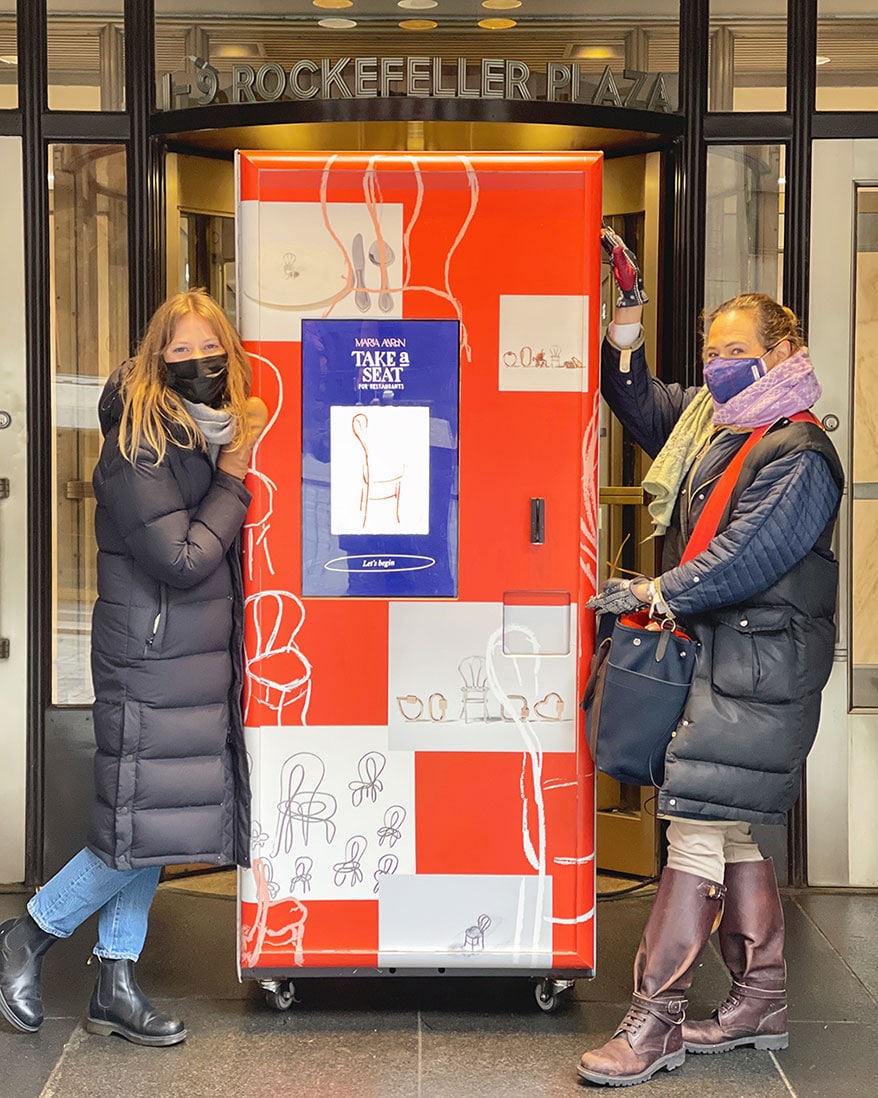
Marla Aaron and her team installed a pop-up vending machine in Rockefeller Plaza to sell charms benefiting local restaurant owners.
Aaron found strength in 2020, in particular, by sharing her good fortune and encouraging teamwork.
Advertisement
Every Mother’s Day since 2015, she has given away a sterling silver piece of her signature lock jewelry to single moms in a campaign called Lock Your Mom. The first year she gave away 50; this year, she’s ready to give away 1,000. In 2020, when she rallied her team to prepare for the annual event, it bolstered morale and gave employees quarantined at home something meaningful to work on. “It put us on the right path mentally,” she says.
A new philanthropic effort born in 2020 was inspired by the plight of restaurants, which put Aaron’s own business challenges in perspective. Throughout the year, as Aaron regularly walked about 40 blocks from her office in Midtown toward her residence in East Harlem, she noticed the efforts restaurant owners had made just to stay open. One day, she’d see an outdoor space with flowers, the next day the flowers would be gone, and a day after that, a bubble would pop up to try to protect diners from the cold. “I thought, these business owners are ripping their hearts out trying to make their businesses work in New York in the middle of winter.”
That observation inspired her Take a Seat for Restaurants initiative. In early December, when she Googled “What is the most common restaurant chair in the world?” she realized it was the classic aluminum chair she’d seen stacked up all over New York. She talked with her team about making a 2-inch sterling silver replica charm of the chair that could be sold online as well as in a vending machine pop-up in a high-profile location.
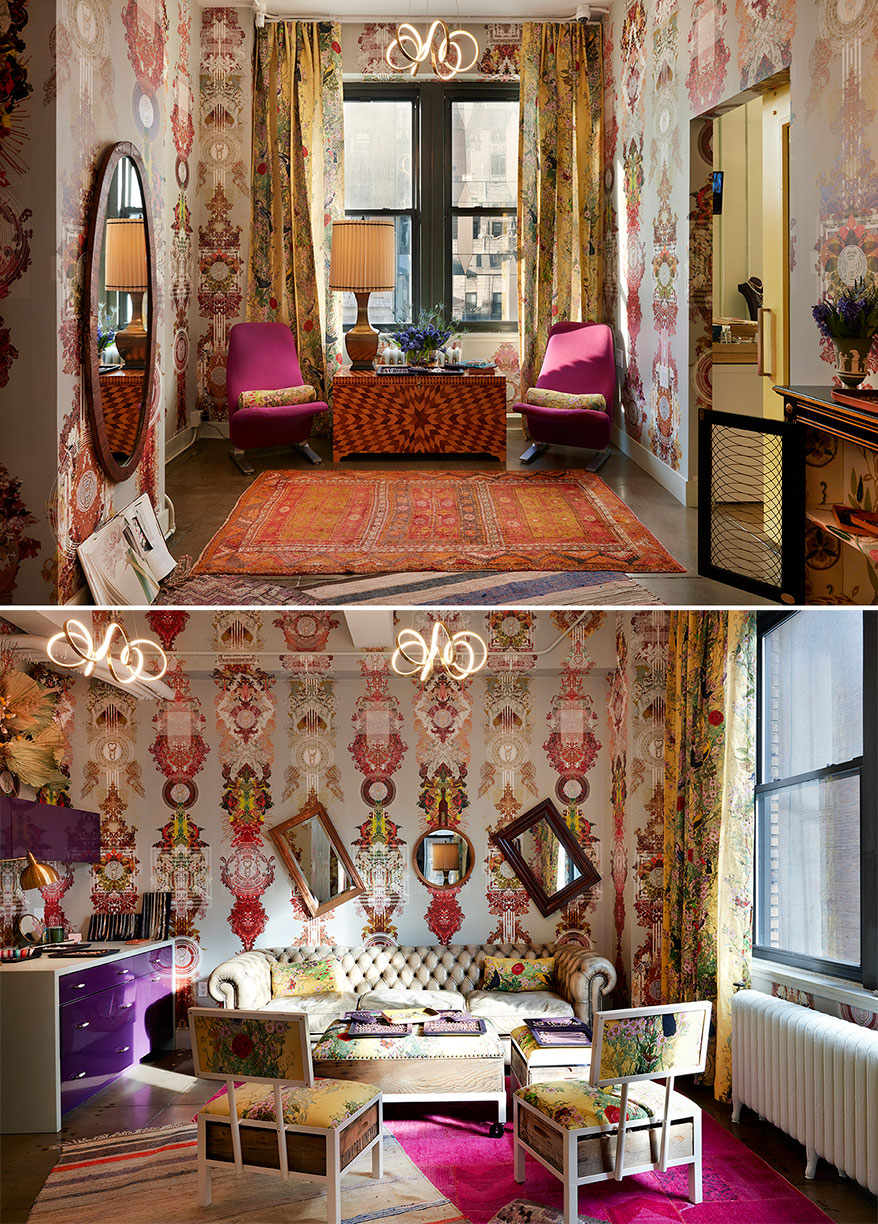
Marla Aaron’s new showroom features maximalist colors, shapes and textures, and can be accessed by appointment only.
She contacted Chef Jose Andres’ World Central Kitchen, which quickly embraced the idea. “Then I thought, ‘How cocky can I be?’ I called Rockefeller Center and they said, ‘You can put that vending machine wherever you want.’” The charm, which debuted in mid-February, retails for $250. All proceeds benefit World Central Kitchen, which uses the power of food to heal communities while keeping restaurants in business.
By protecting her staff, forging ahead with business plans and finding ways to help others, Aaron achieved more than she thought she could in a tough year. A year ago, her only goal was to get to the end of 2020. “We did much better than that,” she says.
Emergency Protocol Plan Saves The Holidays For Thom Duma
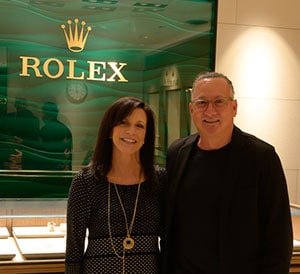
Jackie and Tom Duma
The biggest challenge Tom Duma faced last year surfaced with a case of the sniffles in November.
Early in the month, Thom Duma Fine Jewelers in Warren, OH, had rocked a bridal event, creating momentum and a strong start to holiday sales. But not long after, one member of the six-person sales team tested positive for COVID-19.
Nearly everyone on staff had had contact with someone who had been exposed to the coronavirus.
On Nov. 20, the store closed while everyone quarantined and got tested.
By the time they reopened on Black Friday, the team had devised a new business model with the goal of keeping employees healthy while staving off another shutdown.
An administrator and a jeweler each worked on a lower level in closed offices, communicating only by phone. Sales staff was divided into two teams of three. One team worked Monday, Wednesday and Friday; the other worked Tuesday, Thursday and Saturday. They rotated on weekends. On days the teams worked from home, they set up appointments, made virtual sales calls and engaged in clienteling. Duma went home to work indefinitely, on call in case either team had a COVID scare. A security guard ensures only six people are in the small space at any one time, scans foreheads for fevers, and signs in each customer, who must don a mask and use hand sanitizer.
“As it turned out, we had the best November of my career and we were open only three weeks,” Duma says. “We made it through with no more sickness and managed to have sales similar to last year in December. We also stepped up virtual selling, curbside drop-off and pickup along with delivery to home or office.
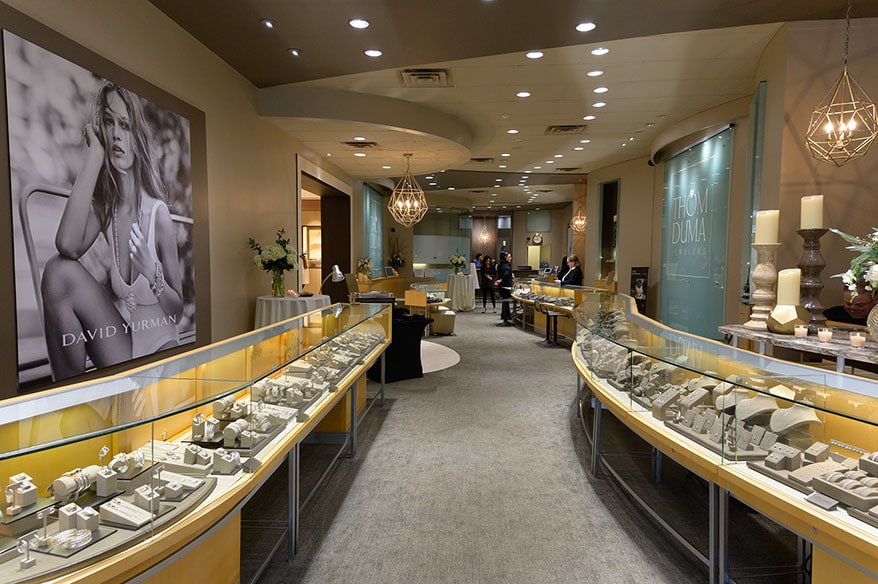
Thom Duma Fine Jewelers had to close due to COVID-19, subsequently reopening with procedures in place to prevent another outbreak.
“It was the first time in 40 years I didn’t work the sales floor in December,” Duma says. “I love it. I’m finding more time to analyze and strategize.”
Last spring, Duma and the team set the tone for a successful year during the initial seven-week shutdown by calling their top 10,000 customers to ask what they might need. They started out by saying, “This is not a sales call. Just wanted to reach out and see how you are doing during these trying times.” After that, they would allow the customer to drive the conversation. Some were short, while others lasted over 30 minutes. The team was instructed not to bring up jewelry or sales unless the customer did. The calls led to the business donating 1,000 rubber gloves to an ambulance service and delivering lunch to some 50 clients. They even paid one customer’s rent. Others simply asked for prayers.
Optimism And Community Support Sustain Windy CityDiamonds
Garry Zimmerman, owner of Windy City Diamonds in Chicago, has a newly renovated showroom, but the process to get there was heart-wrenching.
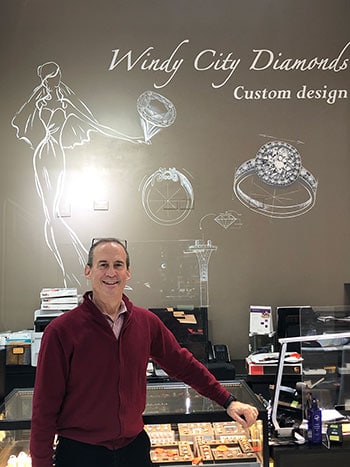
Garry Zimmerman
After being shut down initially for COVID-19, Zimmerman responded like many other retailers did, working with clients on Zoom and posting updates on Facebook and Instagram. He was scheduled to reopen June 1, but on May 28, burglars invaded the store, which is in a prominent corner location on Jeweler’s Row in Chicago. The intruders, he says, were members of organized gangs unaffiliated with Black Lives Matter.
On Friday night, they used a pipe to break a couple of their 10-by-14-foot glass-paneled windows, leaving a mess, which Garry, his brothers and a cleaning crew spent 11 hours cleaning up.
On Saturday night, Zimmerman watched security camera surveillance for four hours as intruders returned, senselessly breaking every piece of glass in the store as well as every computer, desk and cabinet. They used hammers to punch holes in the cabinets. They dropped an expensive microscope from a second story landing into the stairwell. “I kept calling the police and the building security, and they didn’t do anything. I saw someone walk in with what looked like a stick of dynamite and I thought they were trying to blow up my vault.”
But jewelry was locked up. They didn’t take a thing.
“Twice was really disheartening, but I quickly jumped on trying to rebuild,” Zimmerman says. “It took us six weeks to put the store back together. We replaced all showcases, desks, computers, equipment and were finally ready to open.
We were open for one week and there was one more evening of riots in Chicago, which again did a lot of destruction in our store. This time, intruders broke a picture window, climbed through and went straight to the vault. They knew exactly where to go, but we have a high- security vault and they came in with only a hammer and a chisel.
“Being broken into three times really was mentally challenging for us, but we persevered, rebuilt again, and we finally opened up our store again. We were blessed to have many of our past clients come in to support us and we had a strong fourth quarter, but all in all the year has been a mental roller coaster.”
Windy City Diamonds’ plight garnered extensive media attention, and with that came community support and referrals. “We have a very good reputation and a nice client base and people were pouring out to help us remain in business.”
Zimmerman had planned to rearrange the whole store, but in the end settled on the floor plan he had in the beginning, which makes the most of the small space. Upgrades include wallpaper, wood floors and a mural painted on one of the walls that illustrates the custom design process.
Zimmerman found strength in 2020 in both his natural optimism and in the importance of supporting his staff. “When COVID hit, we applied for PPP, but in the meantime, I paid everyone 100 percent even though they weren’t working.
I was able to keep my staff whole even after the destruction.”
Love Is The Theme For Steve And Melissa Quick
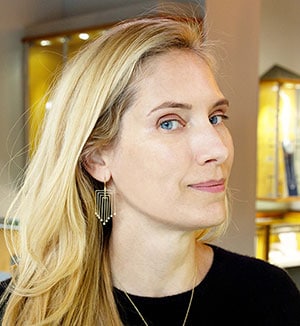
Melissa Quick
By June, It had been a long year already for Steve and Melissa Quick, owners of Steve Quick Jeweler in Chicago.
The mandated COVID-19 shutdown came on March 18, the day before their highly anticipated wedding band trunk show was scheduled to begin with 62 confirmed appointments.
They had optimistically rescheduled it for June. Two days prior to their scheduled reopening the first week of June, the Quicks were summoned to the store by their alarm company, which warned Steve and Melissa that police would be unable to meet them there. Every jewelry store alarm on the North Side had sounded within 20 minutes.
“We were targeted,” Melissa says. “They had bricks and baseball bats and started hitting the windows to break them. Fifteen people piled out of three cars and went through the windows racing into the store for whatever they could grab.
Then almost as quickly as they came, they drove away.”
After they left, Steve arrived, clutching only a claw hammer. Drivers slowed to size up Steve, his hammer and his friend who had joined him to try to protect the store. Ultimately, the vigil that night was successful, if harrowing. But danger persisted. By night three, they’d teamed up with a neighbor to hire a security guard.
Melissa says they were fortunate because the store didn’t need to be rebuilt. “They got a cash drawer with a few hundred dollars and a lot of base metal sample rings. At some point, you know they showed up at a pawn shop or a recycling place and found out what that was worth. That’s my payback to them. The glass cost more to replace than what they got.”
They knew they’d have to wait eight weeks for glass replacement because “the entire city was broken,” says Melissa, which meant they wouldn’t be back to what counted as normal in 2020 till mid-August. “It’s hard to sell sparkly jewelry when your store is covered in plywood.”
But the Quicks reopened the second week of June anyway, painting messages of love on the plywood, which later morphed into a huge “love” mural on the side of the store.
“My sister, who works here, has two little kids, so they filled the whole front of the store with hearts while it was closed,” says Melissa. “The message was, ‘We’re not here, but we’re sending love.’”
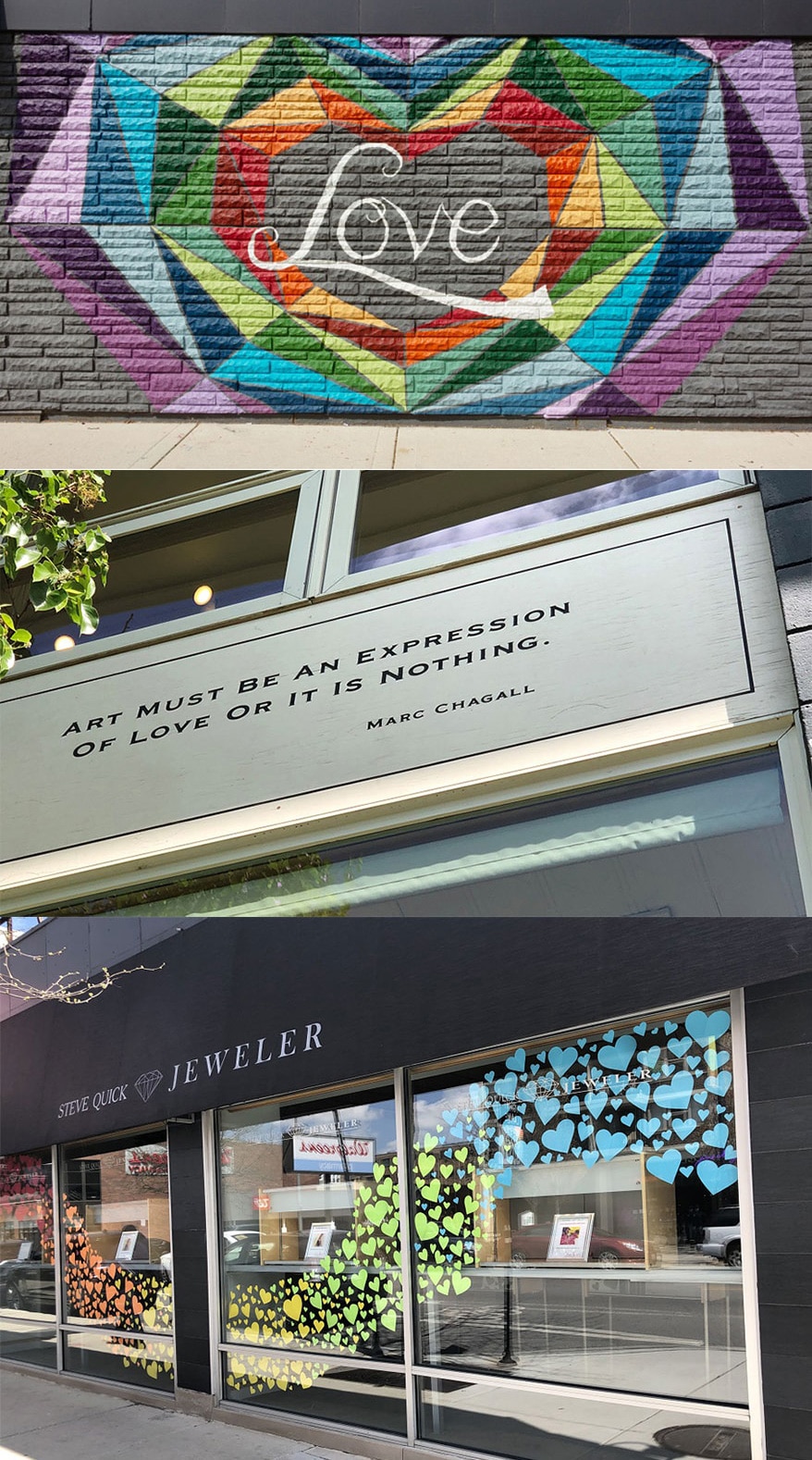
“Love” began as a personal intention that became part of the business ethos.
When the glass was smashed and replaced with plywood, the team painted hearts on it. “We decided to paint a message of positivity because some people were being negative about the protests. Our mindset was: Love wins.”
When they did reopen, they were limited to five people per 1,000 square feet, the size of their showroom. They had decided to pivot to an appointment-only business, anyway, and Melissa offered curbside service and made home deliveries to established clients. “I was meeting people on their porches to show them jewelry,” she says. “Delivery endeared us to all of our clients who felt isolated and in a tough spot.”
That mode of business has endured. “Appointment-only has been transformational for us,” Melissa says. “I never utilized FaceTime or Zoom prior to the pandemic, unless a client had moved away. Now with a lot of people not going into a store in a year, it’s become more of a way to communicate.” Clients who want to shop in the store use the website as a catalog and know what they want to see.
Christmas success came as a pleasant surprise, with the best December since 2012, even though they were open five days a week and only by appointment. Usually in December, they’d be working 10 hour days, seven days a week, and would feel wrecked even before the biggest rush hit.
“We didn’t work like fiends,” Melissa says. “We watched Christmas movies, Zoomed with friends and actually enjoyed the holiday season. Go figure! I can tell you we will never do 50-plus hours a week in December again.”
FOR CLODIUS & CO. FAILURE IS NOT AN OPTION
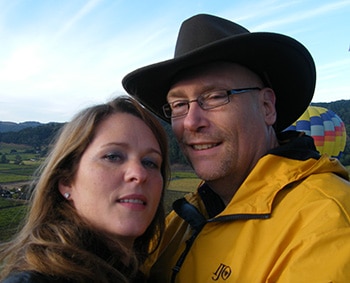
Mark and Monika Clodius
For Mark and Monika Clodius, 2020’s most haunting memory was of standing in the smashed-out vestibule of their store in the middle of an early summer night, surrounded by broken glass while carrying guns and waiting for the building to be secured. Organized groups of jewel thieves were taking advantage of police distraction engendered by Black Lives Matter protests and random looters.
All year, the couple had been forced to think on their feet, while adapting to ever-changing conditions. They learned how to sell engagement rings in their parking lot and they now offer a personal shopping service that works with FaceTime, phone or text. They’re inching toward e-commerce and offering contactless service. A goal for 2021 is to upgrade inventory photography.
“My general set point is optimistic,” Mark says. “I’m not scared of failing, and I’m not trying to set a record in sales this year, either.” They embraced the philosophy of “failure is not an option.”
They’ve shifted their focus to making the most of what they have on hand already, from personnel to inventory. “We have assets that are human and we have assets that are material, gold and gemstones,” Mark says. “We’re using our human assets to leverage our material assets into making jewelry for ourselves, especially diamond basics and bridal; instead of buying a line, we try to find styles and trends and make a ring or two that hits some of those trends.”
They were able to defer mortgage payments through an SBA program, obtain PPP funding and bring back furloughed employees at reduced hours. “We’re happy to have a business that enables our employees to pay their bills.” The Clodiuses also did whatever they could to cut costs; buying a lawn mower and taking care of their own grounds maintenance saved a few thousand dollars in 2020.
“I’m very thankful that some of the things we’ve done proved to be good decisions,” Mark Clodius says. “Even some of our inaction. We are over-inventoried and have been for many years. Having these things enabled us to sell down our inventory at regular prices and that really helped the company financially, coupled with making and remaking inventory.” While bridal has been strong, so have colored gemstone rings. “That speaks to a strength we’re paying more attention to,” Mark says.
Advertisement
Every year that their local newspaper has done a “best of community,” including 2020, Clodius & Co. has been voted best jeweler.
“I know we have a good customer base, and it’s important to be there for them and try to anticipate what that’s going to mean. There’s something to be said about keeping a small business going.”